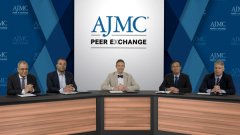
Time-to-Response Correlation to HCC Treatment Effectiveness and Patient Prognosis
Expert panelists discuss key factors contributing to “time to response” in HCC treatment, and its impact on patient prognosis.
Episodes in this series

The discussion between the medical experts primarily revolves around the treatment and management of hepatocellular carcinoma (HCC), a form of liver cancer. The conversation begins with a focus on the influence of a single priming dose on clinical activity, especially concerning pharmacokinetics and dynamics. The experts emphasize the importance of priming the immune system to combat cancer effectively, using checkpoint inhibitors as an intelligent approach compared to traditional chemotherapy.
The dialogue transitions to the significance of monitoring time to response in novel therapies for HCC. The experts delve into the complexities of assessing response using various criteria such as RECIST and modified RECIST, while also discussing the concept of pseudo-progression in immunotherapy. They note the lack of a definitive biomarker for HCC, highlighting the importance of early responders in predicting long-term outcomes.
The experts then explore factors influencing the variability of time to response in HCC treatment. They stress the necessity of individualized clinical judgment based on patient-specific factors such as tumor burden, liver function, and overall health status. The discussion acknowledges the potential for variability in response times among patients, emphasizing the need for a nuanced approach in clinical decision-making.
The conversation delves into the advancements in immunotherapy for HCC, particularly the effectiveness of checkpoint inhibitors in combination with other drugs. The experts highlight the positive outcomes from the IMbrave150 trial and the HIMALAYA study, showcasing the potential of immunotherapy in the treatment landscape. They express optimism about the evolving role of immunotherapy in HCC treatment, emphasizing the need for continued research and development in this area.
Furthermore, the experts touch upon the challenges associated with evaluating treatment effectiveness, particularly in cases of pseudo-progression, where careful monitoring is necessary to distinguish between true disease progression and temporary enlargement. They discuss the potential use of ctDNA as a monitoring tool in immunotherapy, although its application in clinical practice is still under investigation.
Throughout the discussion, the experts stress the critical role of close patient monitoring and the importance of comprehensive data analysis and clinical judgment in the context of HCC treatment. They highlight the dynamic nature of the disease and the need for a holistic approach that considers individual patient characteristics and treatment responses.
Overall, the experts express a positive outlook for the future of HCC treatment, particularly with the growing body of evidence supporting the efficacy of immunotherapy in combination with other therapeutic approaches. They underline the need for further research and the development of reliable biomarkers to improve treatment outcomes and patient prognosis in the field of hepatocellular carcinoma.
Video synopsis is AI-generated and reviewed by AJMC editorial staff.
Newsletter
Stay ahead of policy, cost, and value—subscribe to AJMC for expert insights at the intersection of clinical care and health economics.





